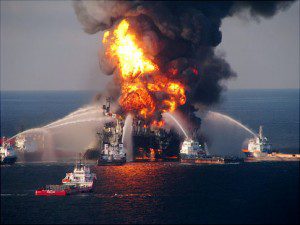
Transocean Deepwater, Inc., will plead guilty and pay $1.4 billion in civil and criminal penalties for its role in causing the nation’s largest oil spill in 2010, the U.S. government said Thursday.
The Justice Department said in a statement that the company would plead guilty to violating the federal Clean Water Act, saying that it had filed the proposed settlement Thursday in U.S. District Court in Louisiana. The proposal is subject to court approval.
Transocean, the world’s largest offshore drilling contractor, confirmed the proposed settlement in its own release sent to investors from its headquarters in Switzerland. The company said that as part of the agreement, the Justice Department won’t pursue further action against it.
The company admitted wrongdoing and will pay $400 million in criminal fines, and continue to help in a federal criminal investigation, DOJ said. Also, Transocean Ocean Holdings LLC, Transocean Offshore Deepwater Drilling Inc., Transocean Deepwater Inc. and Triton Asset Leasing GMBH agreed to pay an additional $1 billion to resolve federal Clean Water Act civil penalty claims for the three-month-long spill at the Macondo Well and the Transocean drilling rig Deepwater Horizon.
The April, 2010 spill shut down the northern Gulf of Mexico and, in addition to biological damage, caused a massive slowdown in the fishing industry and tourism in Gulf economies, including along the Florida Panhandle. Eleven workers were killed and the spill was the largest in U.S. history. The spill also had an effect on oil drilling politics in Florida – effectively ending for the time discussions about opening more of the Gulf closer to Florida shores to new drilling.
The settlement also requires the company and its subsidiaries to put in place measures to improve safety and emergency response ability at all drilling rigs in U.S. waters.
“This resolution of criminal allegations and civil claims against Transocean brings us one significant step closer to justice for the human, environmental and economic devastation wrought by the Deepwater Horizon disaster,” U.S. Attorney General Eric Holder said in the statement. “This agreement holds Transocean criminally accountable for its conduct and provides nearly a billion dollars in criminal and civil penalties for the benefit of the Gulf states. I am particularly grateful today to the many Justice Department personnel and federal investigative agency partners for the hard work that led to today’s resolution and their continuing pursuit of justice for the people of the Gulf.”
In agreeing to plead guilty, Transocean Deepwater Inc. admitted that members of its crew, at the direction of the British oil company BP, were negligent in failing to fully investigate indications the Macondo well wasn’t secure, the Justice Department said.
“These important agreements, which the company believes to be in the best interest of its shareholders and employees, remove much of the uncertainty associated with the accident,” Transocean said in its own statement. “This is a positive step forward, but it is also a time to reflect on the 11 men who lost their lives aboard the Deepwater Horizon. Their families continue to be in the thoughts and prayers of all of us at Transocean.”
Under the order that was filed in court, $150 million of the $400 million criminal recovery is dedicated to restoring and preserving marine and coastal environments in the affected states. Some of the money will be used for barrier island protection off the coast of Louisiana and research on oil spill prevention and response, but it’s not clear how the total will be split among the states. In addition to Louisiana and Florida, Mississippi and Alabama were also affected.
Transocean said it will make payments totaling $560 million in the coming year, and $460 million in 2014, followed by progressively smaller payments in the out years through 2017.
by David Royse


